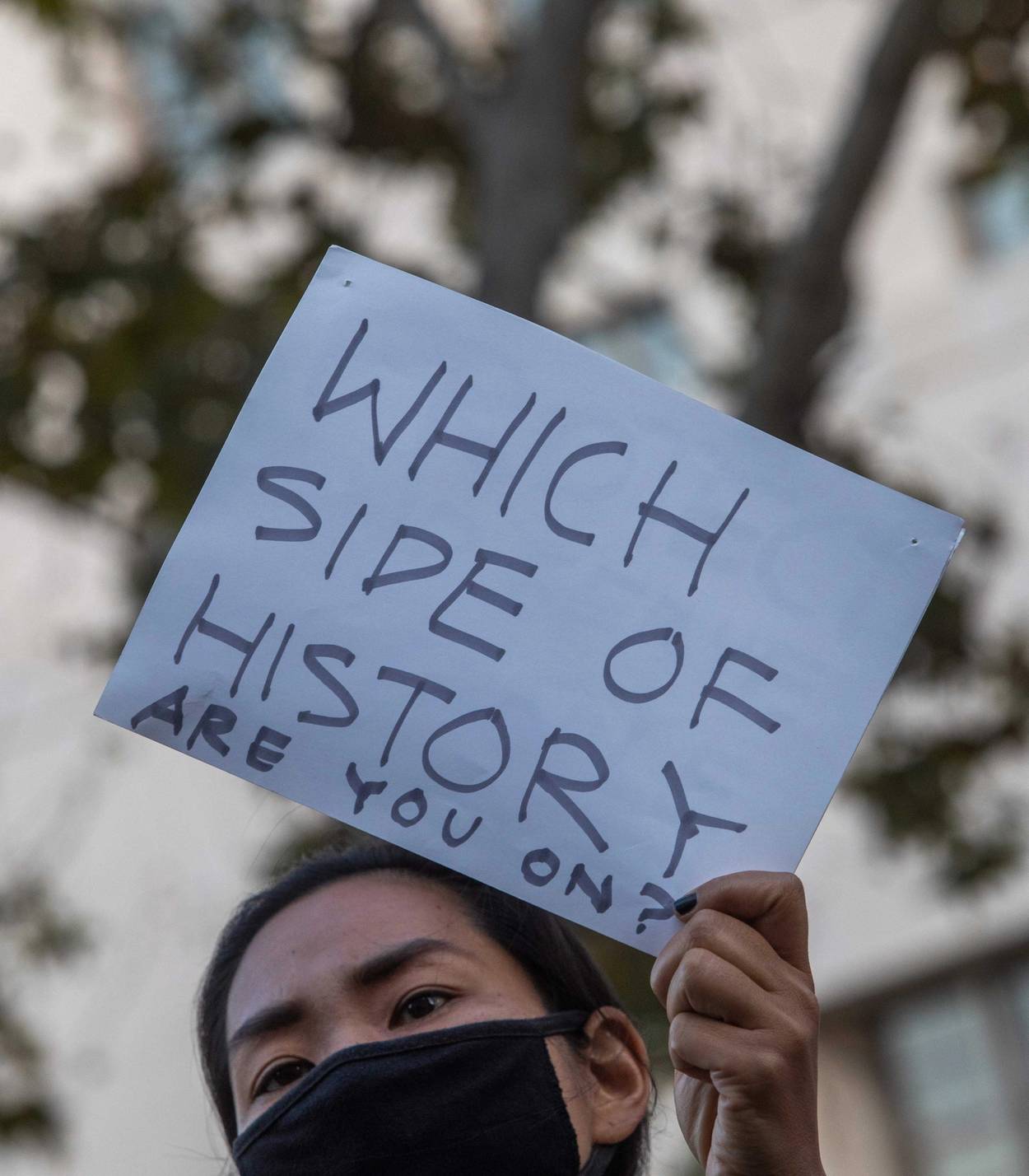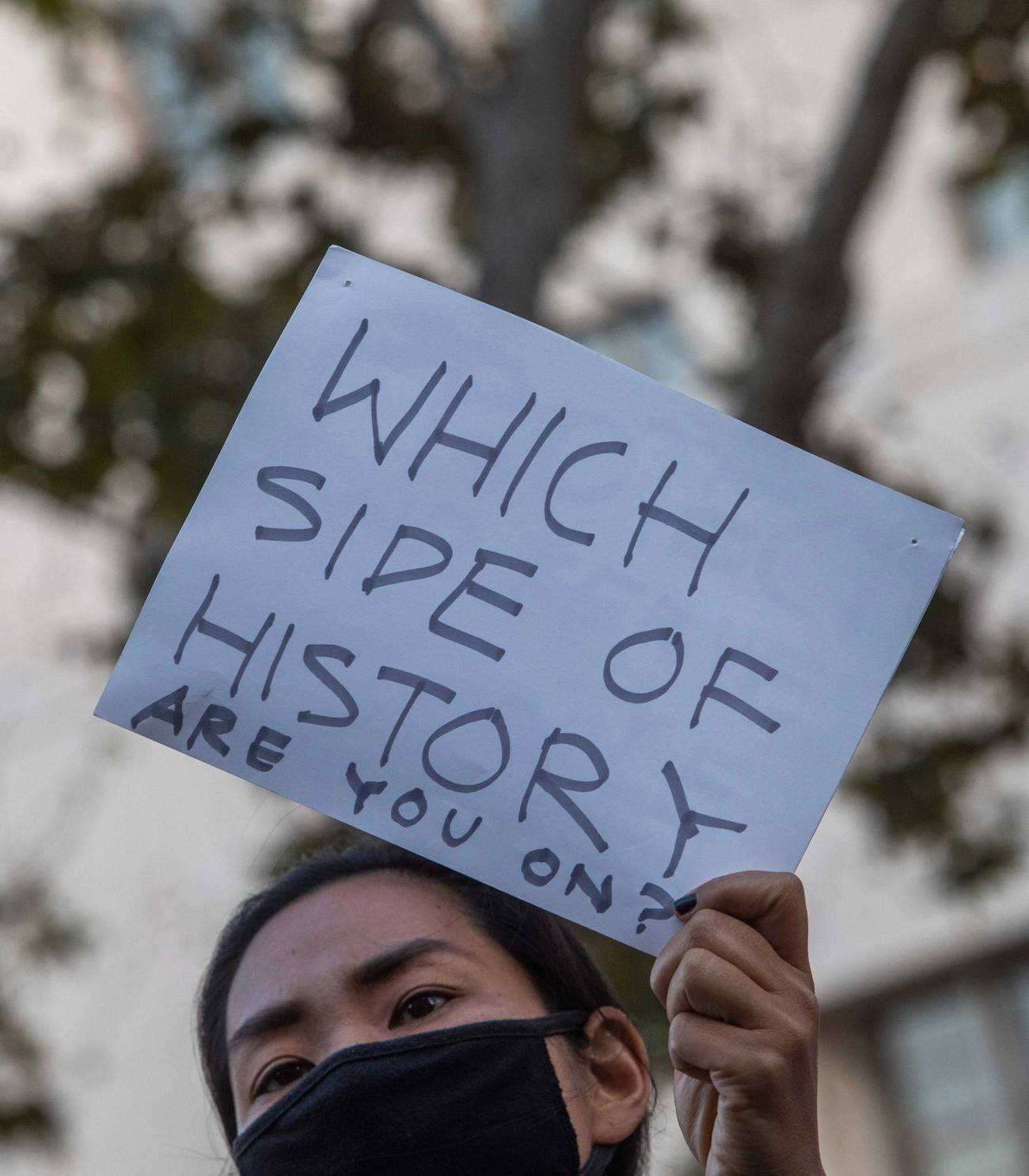The Woke and the Un-Woke
How American politics is fast becoming a religious conflict between a hegemonic new faith and its multifarious foes




America is undergoing a godless revival. A new creed—called “social justice,” “wokeism,” or “the successor ideology”—resembling religion yet avowedly secular and anti-spiritual, is spreading across the country. Its seminaries are the nation’s elite universities, its missionaries work in prestigious newsrooms. Adherents are remaking powerful institutions by “canceling” anyone who dissents or lacks zeal for the cause. Like any good revival, this one is replete with hellfire preaching. Eager audiences are told of their inescapable guilt, or “privilege.” Repentance is demanded, but forgiveness is not offered.
An overlooked aspect in the now crowded conversation around the rise of “wokeness” is its potential to transform a decadesold pattern of cultural and political divisions in America. As secular progressivism becomes more zealous and evangelical, trampling over traditional American notions of limited governance and tolerance, it may be drawing together common enemies.
Catholic traditionalists, Orthodox Jews, middle American small-business owners, and skeptical liberal atheists may not seem to have much in common, yet each group is threatened by the hegemonic power of progressive ideology. As a consequence, the defining fault line in American politics may no longer be between left and right. The relevant division now is between people who accept the binding, state-backed power of the new post-secular creed and the diverse coalition of groups—including traditional religious communities, left-wing materialists, and one-time liberals alienated by the creeping dominance of left-wing absolutism—who resist its authority.
Wokeism imagines a utopian world, one ruled without force, unbound by borders, freed from biology. We must “defund the police,” “abolish ICE,” and affirm that “trans women are women.” Heresy on the cardinal issues of race, the nation, and sex is not tolerated. James Bennet, opinion editor of The New York Times, was forced to resign after running afoul of the new orthodoxy. He joins a growing list of people that includes prominent media and cultural figures alongside ordinary citizens who have lost their jobs or otherwise been punished for alleged ideological infractions. “Wokeism” is not merely an idle belief system—increasingly it is the official philosophy of the American ruling class, employed to justify the exercise of coercive power. Governmental authorities and corporations now coordinate in enforcing the dictates of the new secular progressive faith, often at the cost of protecting the constitutional liberties of traditional religions.
Consider the response to the novel coronavirus. Actual religious services among Jews, Christians, and Muslim communities were banned, while mass demonstrations were cheered on by elected officials, civic leaders, and public health professionals. New York Mayor Bill de Blasio threatened to arrest attendees of mass gatherings after a funeral in Brooklyn for an Orthodox rabbi drew 2,500 mourners. But he cheered on the protests that followed the death of George Floyd. (One, a “Black Trans Lives Matter” march in Brooklyn, drew an estimated crowd of 15,000.) In his view, demonstrators who were “grappling with an extraordinary crisis seeded in 400 years of American racism” deserved prerogatives not merited by “the devout religious person who wants to go back to services.” De Blasio’s statement provides the clearest articulation yet offered by any political figure of the way in which the original understanding of America has been reversed: The state, having aligned itself with one creed over others, no longer serves to protect freedom of religious expression but rather officiates secular doctrines of the establishment anti-religion.
How can the trend toward woke hegemony be reversed? Some believe the answer lies in defending neutral values such as free speech and free inquiry. That defense is certainly necessary—the acceptable range of opinion has become too narrow; academic research and scientific investigation have been corrupted politically. But resisting a crusading creed like wokeism will require more than insisting on freedom of thought and speech. It will require defending a different and sounder set of ideas, a social consensus that is non-utopian. Such a consensus would recognize the biological differences between men and women and the necessity of the family. It would recognize that citizenship is a relevant legal category, that nations have boundaries. It would recognize that race is not the supreme reality.
What hopes are there for building an alternate social consensus in 21st-century America, one that has enough power and appeal to challenge the woke ascendancy?
In the 1950s, the sociologist Will Herberg famously described America as divided into three religious camps: Protestant, Catholic, and Jew. These divisions were a matter of belonging rather than belief. Even an unbeliever would count as belonging to one of the three categories on the basis of his background and milieu.
If a similar study were conducted today, the picture would be radically different. America’s cultural landscape is no longer defined by the three broad categories of Protestant, Catholic, and Jew. It is now (to borrow a formulation suggested to me by Samuel Goldman, a Tablet contributor and professor of political science at George Washington University) defined by the interaction of Woke, Trad, and None.
Despite the success of the Great Awokening, traditional faith has not disappeared. The soft edges have fallen away, but a hard core remains. Born-again Christians, mission-going Mormons, dogmatic Catholics, and Orthodox Jews are very much a part of American life. These “trads” (to broaden a term that is sometimes applied more narrowly) identify with traditional bodies of belief that have distinctive rituals, creeds, and practices.
Meanwhile, many of the least committed—the “cultural Catholics” and “High Holidays Jews” who once belonged without believing—have ceased to identify with any traditional faith. Some 30% of Americans identify as atheists, agnostics, or “nothing in particular.” The number of these “nones” in the United States has increased in recent decades by some 30 million people. While their numbers are growing in both major parties, the nones are far more likely to identify as Democrats than as Republicans, and as liberals rather than conservatives.
Within this broad group of “nones,” one can identify two distinct groups: woke crusaders who want political dominance on one side, and on the other nonreligious moderates who want a modus vivendi and the right to be left alone. The former may not belong to any church, but they act like true believers. The latter are the true nones, those who profess neither a traditional religion nor the new woke creed.
A 2014 Pew poll found an even split among nones asked about the size of government—47% wanted smaller government with fewer services and 46% wanted a bigger government with more services. Another roughly even split among “nones” is between 36% identifying as moderate and 39% who identify as liberal (18% labeled themselves conservatives). But when results are separated out by political affiliation, the division between the two cohorts of “nones” is stark. Among Republican “nones,” 75% said they want smaller government versus 60% of Democrat “nones” who said they want larger government—but among “nones” who do not lean toward either party, the preference is for smaller government by 51% to 38%.
Despite their differences, an alliance could form between “trads” and the true “nones” who reject religion but may well see it as less of a threat than the growth of woke government power. Trads have all-encompassing beliefs that offend liberal and secular sensibilities. But they affirm the reality of biological differences between the sexes. They believe that your deeds and beliefs are more important than your race. Even when they reject the political formulations of liberalism, most still believe in the virtue of liberality and tolerance. Because they believe in the fallenness of man, they uphold the possibility of forgiveness. Like the “nones,” most “trads” are not utopians. Unlike the woke, they can tolerate those with fundamentally different beliefs. Trads and nones will never agree, but they can ally.
Signs of a none-trad alliance can already be seen in the growing connections between the relatively secular “Intellectual Dark Web” and conservative religious intellectuals. Last year, Bishop Robert Barron—one of the most intellectually sophisticated and technologically savvy leaders of the Catholic Church—appeared on the podcast of Jordan Peterson, whose work he has praised. Bret Weinstein and Heather Heying—atheists who supported Bernie Sanders—recently became visiting fellows at Princeton University’s James Madison Program, an organization run by the conservative Catholic thinker Robert P. George.
Wokeism could well become America’s established faith. If that outcome is to be prevented, the more skeptical, scientific, rationalist opponents of wokeism will need to join with people who have different reasons for opposing its utopian claims. Liberals who stress the provisional nature of knowledge, resist all-encompassing political claims, and seek space for public error and disagreement, have grounds for agreement with Jews, Christians, and others who believe that men are sinful and fallen. Leftists who are committed to the working class and focused on material progress above cultural symbolism, should be open to the moral and religious views held by many of its members.
This alignment is unlikely to be comfortable or uncomplicated. It would require sacrifices from both sides. Religious believers would have to make clear that they are able to tolerate the kind of pluralism that woke progressives cannot, even if they reject liberal ideology and the managerial approach to diversity. Anti-woke leftists and liberals would have to give up the idea that reason and religion, freedom and authority, are somehow opposed. Creating an alliance between the skeptical and the religious, the nones and the trads, will not be easy. But it may prove necessary.
Matthew Schmitz is senior editor of First Things.